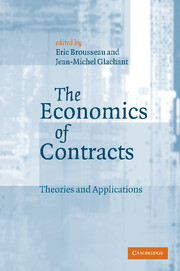Book contents
- Frontmatter
- Contents
- List of figures
- List of tables
- List of contributors
- Acknowledgments
- Part I Introduction
- Part II Contracts, organizations, and institutions
- Part III Law and economics
- Part IV Theoretical developments: where do we stand?
- 10 Transaction costs and incentive theory
- 11 Norms and the theory of the firm
- 12 Allocating decision rights under liquidity constraints
- 13 Complexity and contract
- 14 Authority, as flexibility, is at the core of labor contracts
- 15 Positive agency theory: place and contributions
- Part V Testing contract theories
- Part VI Applied issues: contributions to industrial organization
- Part VII Policy issues: anti-trust and regulation of public utilities
- Bibliography
- Index of names
- Subject index
14 - Authority, as flexibility, is at the core of labor contracts
Published online by Cambridge University Press: 16 January 2010
- Frontmatter
- Contents
- List of figures
- List of tables
- List of contributors
- Acknowledgments
- Part I Introduction
- Part II Contracts, organizations, and institutions
- Part III Law and economics
- Part IV Theoretical developments: where do we stand?
- 10 Transaction costs and incentive theory
- 11 Norms and the theory of the firm
- 12 Allocating decision rights under liquidity constraints
- 13 Complexity and contract
- 14 Authority, as flexibility, is at the core of labor contracts
- 15 Positive agency theory: place and contributions
- Part V Testing contract theories
- Part VI Applied issues: contributions to industrial organization
- Part VII Policy issues: anti-trust and regulation of public utilities
- Bibliography
- Index of names
- Subject index
Summary
Introduction
From an external point of view, the treatment of labor contracts by modern microeconomic theory reveals an exceptional uneasiness. Either they are entirely unspecific, similar to sales contracts for a commodity (except that the commodity consists now of a service, rather than a good stricto sensu): this is the road followed by general equilibrium theory (see Debreu 1959, §2.4; for more subtle details, see Arrow and Hahn 1971, pp. 75–6); or they show some specific features, which makes them instances of more general types of contracts: insurance contracts (see Rosen 1985) or principal–agent relationships (see Salanié 1994). Indeed lawyers from any country in the industrial world (see Supiot 1994, part II) could only be surprised by the apparent reluctance of economic theory to deal straightforwardly with the essential property of labor contracts: the compliance of the salaried worker with his employer's authority (i.e. the acknowledged right of giving orders), in exchange for a predetermined wage, independent for the main part of the final proceeds.
Now the surprise is reinforced, not alleviated, by the fact that there is one – exactly one – such model of labor contract, in the economic literature: the one built by Simon (1951). Of course, some economists were aware that an authority relationship should lie at the heart of the contractual link between employer and employee (for an early mention, see Coase 1937). But it was not until 1951 that the first mathematical model of authority relationship was devised by Simon, drawing on the work of Barnard (1938), an expert in management and not an academic.
- Type
- Chapter
- Information
- The Economics of ContractsTheories and Applications, pp. 241 - 250Publisher: Cambridge University PressPrint publication year: 2002



